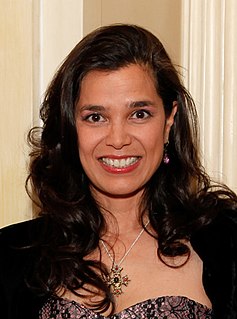A Quote by Faith Ringgold
Black women have never embraced feminism. They didn't embrace it in the '50s and '60s; they're not embracing it now. That's not new. I think it's a tendency among women in general not to be supportive of each other.
Related Quotes
I certainly embrace all the movement that's going on these days about equality for women and equal rights. In general, I would apply that to all nationalities and all races. I think we do need more awareness, generosity, and compassion than we have right now. But in terms of feminism, I embrace it wholeheartedly. Not in a kind of militant way, but I've always known that it matters.
I think feminism has always been global. I think there's feminism everywhere throughout the world. I think, though, for Western feminism and for American feminism, it not so surprisingly continues to center Western feminism and American feminism. And I think the biggest hurdle American feminists have in terms of taking a more global approach is that too often when you hear American feminists talk about international feminism or women in other countries, it kind of goes along with this condescending point of view like we have to save the women of such-and-such country; we have to help them.
We can see, from California to New York, from Maine to Florida, Seattle to New Mexico - everywhere there are women's groups. Everywhere there are women who have gotten together to examine global warming, and women who have gotten together to prepare each other for single parenting - there are women who have come together to be supportive to those whose mates are in prison, male or female, partners are in prison. All sorts of gatherings of women. I mean, I'm just celebrating my 80th year on this planet, and I look back 50 years ago and there was nothing like that.
I get very frustrated when I hear women saying, "Oh, feminism is passé," because I think feminism means empowerment. Men can be feminists, too! Many men are feminists. We need feminism. It's not against men; it's about the empowerment of women. It's the respect of women - giving women equal rights, the same opportunities.
The problem with feminism in the second wave was that we fought so much among ourselves, and I think we did so much damage to the movement... and I think the next wave, the third wave, is women mentoring younger women and women helping younger women to enter the political process and the writing world.
There are many feminists who work in the media, and they think that feminism is very important. It is in their own lives, but mostly feminism has had an impact among privileged women in the advanced Western countries. For the most part, it hasn't begun to touch the lives of poor and working women in the Third World, and that distresses me.
There are many things that black women can continue to do to help black folk. First, black women have historically been among the most vocal advocates for equality in our community. We must take full advantage of such courage by continuing to combat the sexism in our communities. Black women, whether in church, or hip-hop, don't receive their just due. Second, when black women are in charge of child-rearing, they must make ever so sure to raise black children who respect both men and women, and who root out the malevolent beliefs about women that shatter our culture.
There are all kinds of ways in which women, together, change the world. And I don't mean that in a cheesy way. I'm not somebody who believes all women should support each other. I believe very strongly in women critiquing each other, just not critiquing each other more intensely because they're women.








































